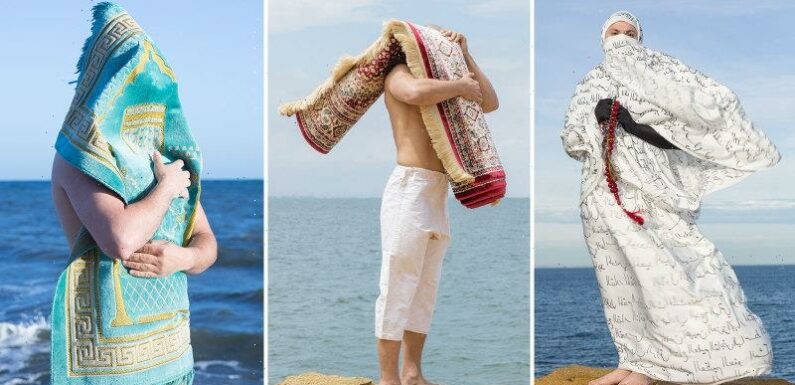
Growing up in Lebanon as one of 12 children, photographic artist Ayman Kaake recalls his mother making pilgrimages to Mecca, the birthplace of the Islamic prophet Muhammad.
She would return with thin, circular cardboard reels featuring images of holy sites that could be viewed in three dimensions when inserted in a View-Master stereoscope machine and held up to the eyes. The images were his mother’s way of talking about how it felt to be away from their country, away from home.
Photographic artist Ayman Kaake pictured in his Melbourne studio. The View-Master gifted to him by his mother can be seen next to him.Credit:Jason South
Kaake, now 35 and having lived in Melbourne for more than a decade, senses his mother grasped his artistic leaning because she gifted him the View-Master, rather than his 11 siblings. Being ninth in birth order, he jokes that he’d assumed he was a “forgotten” child.
After leaving school, Kaake gained a diploma in telecommunications engineering in Beirut. He did it because his parents wanted him to have a good, reliable income, but once that was done, he secretly studied cinematography, lying to his family that he had moved on to a master’s in engineering that year.
Kaake, who is queer, found “open-minded” friends while studying cinematography, although article 534 of the Lebanese penal code, a hangover from the French colonial mandate that ended in 1943, prohibits sexual relations that “contradict the laws of nature”, and is still used to persecute and sometimes arrest LGBTQ people.
A photograph from Ayman Kaake’s upcoming exhibition, 99 Names.Credit:Ayman Kaake
In 2011, after discovering the ruse with his tertiary schooling, Kaake’s parents sent him to Australia (where one of his brothers already lived) with instructions to further his engineering studies. But soon after Kaake arrived, he secretly switched to studying visual arts – painting and printmaking – at Melbourne Polytechnic, then known as NMIT.
Again, unbeknown to his family, the now Greensborough-based Kaake was building his artistic career, creating his film noir-inspired still photography, and featuring on the cover of a US magazine – appropriately named Stubborn – in 2016 as an emerging artist of note.
Arabic songs filled with metaphor can be detected in Kaake’s artistic vision. Visual metaphor from cinema, too: in his 2018 photo series Melancholy, in which Kaake is the model, a cloud hangs above his head. This series is about the death of his father, a hardware store owner, a few years earlier, and the profound effect it had upon his son.
Despite Australia’s freedoms for LGBTQ people, Kaake explains that initially in Australia whenever he wanted to connect with home, he had to do so through conservative expatriates.
“You have to connect with Arabic-speaking people, especially if your English isn’t a strength,” he says, “but the people that migrate from Lebanon to here, they’re still stuck in the traditions back from where they migrated … even while Lebanon has evolved.”
Ayman Kaake’s work takes aim at moral hypocrisy.Credit:Ayman Kaake
Six years after coming to Australia, Kaake decided to reveal to his family that he was an artist. He sent the View-Master back to his mother in Lebanon, loaded with a cardboard disc of seven of his images, including a self-portrait on the theme of feeling isolated: away from their country, away from home.
Something about this very personal work touched his mother’s heart, and she knew her son was following his passion. She proudly showed his View-Master disc to her neighbours. “Look at what my son is doing,” she declared.
For Melbourne’s Midsumma Festival, Kaake’s new show takes aim at fundamentalist barbarism, and the role of religions and governments supporting the criminalisation of homosexuality in more than 70 countries, including a dozen where being gay is punishable by death, including by stoning.
His exhibition, titled 99 Names, is a reference to the names of Allah or God revealed to humanity in the Qu’ran. But Kaake is critiquing anti-human, moral hypocrisy and manipulation, the “atrocities [committed] whilst believers loudly quote from holy books”, he says.
A series of photographs by Ayman Kaake for his upcoming 99 Names exhibition.Credit:Ayman Kaake
“They connect religion with politics to have control … to fit their shiny images of love whilst criminalising the act of love.”
Kaake, whose parents sent all 12 of their children to Christian schools to take advantage of the curriculum and to learn French, includes France’s hypocrisy in that assessment. Some of his gay friends gained refugee status in France, he says; the same country that left the anti-gay article 534 in Lebanon’s penal code.
In one image, Kaake’s face is covered by a prayer rug in a reference to masking oneself in dogma. Elsewhere, his friends are the models: people of different ethnicities, ages and languages who identify as gay, queer and trans; refugees among their number.
Kaake himself undertakes Islamic rituals such as prayer and fasting, though there’s “nothing deeper” about his religious observance, he says.
His parents kept their Islamic observance largely to themselves, he says, their philosophy being their children should have freedom of choice about finding their way to Islam.
As a result, “half of us [children] are very religious: there is my sister, who wears the full burqa, and then some brothers have grown a beard and are pretty religious,” he says.
“The other six are almost like me: one is a fashion designer; one is a hair stylist … we have a whole community in one family.”
99 Names is at the Brunswick Street Gallery from January 28 to February 12.
A cultural guide to going out and loving your city. Sign up to our Culture Fix newsletter here.
Most Viewed in Culture
From our partners
Source: Read Full Article



